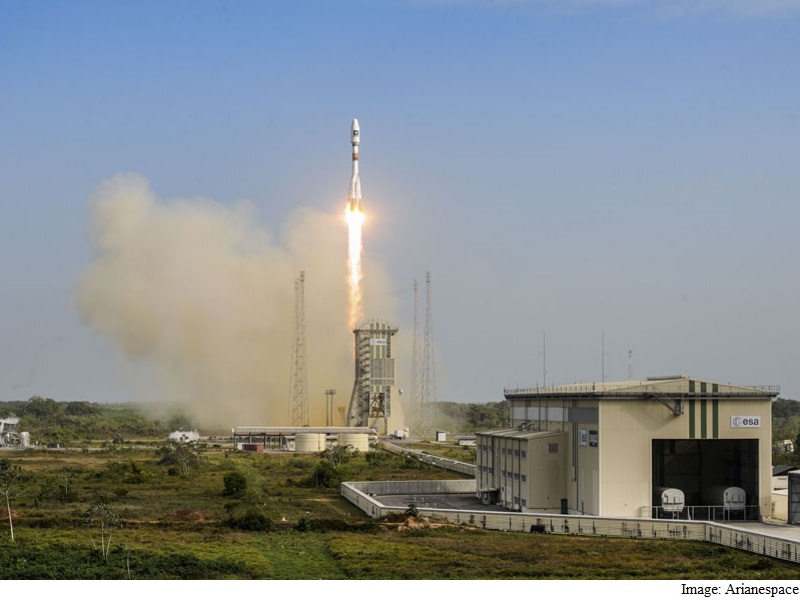- Home
- Science
- Science News
- Europe Speeds Up Launches for Galileo Satellite Navigation System
Europe Speeds Up Launches for Galileo Satellite Navigation System

Europe will launch an extra pair of satellites this year in a bid to speed up full deployment of its multi-billion-euro Galileo sat-nav system, launch firm Arianespace said Thursday.
The additional launch from Europe's spaceport in Kourou, French Guiana, is planned for May 2016, followed by a already scheduled four-satellite launch towards the end of the year, the company said in a statement.
"With these two launches, six new galileo satellites will be deployed in 2016, as in 2015, bringing the total number in the constellation to 18 by the end of the year," said Arianespace.
Galileo, Europe's rival to America's GPS, will ultimately comprise 30 orbiters. Arianespace has earlier said that initial services can start once 16 are in place.
The project, which will also provide crucial search-and-rescue services, has been plagued by delays, technical glitches and budgetary difficulties.
The launch of the seventh and eighth orbiters in March last year was about three months late to allow engineers time to probe an August 2014 mishap that sent satellites five and six into a lopsided orbit.
The pair have since been manoeuvred into a better, more circular path.
The mishap was blamed on frozen fuel pipes on the Soyuz rocket's fourth stage, called Fregat - a problem the European Space Agency says has since been fixed.
The launch of satellites five and six - meant to have been the first fully operational Galileo orbiters - had itself been delayed by more than a year due to "technical difficulties".
The first four orbiters were launched in 2011 and 2012.
The European Commission has budgeted EUR 7 billion ($7.7 billion or roughly Rs. 52,954 crores) for the project until 2020.
The remaining satellites will be launched using a combination of Russian Soyuz rockets, which can take two into space at a time, and Europe's own Ariane 5 ES launcher, which is being adapted to handle four.
The extra Soyuz launch for 2016 had been approved by the European Commission, the European Union's executive body and programme manager of the Galileo programme, said the statement.
For the latest tech news and reviews, follow Gadgets 360 on X, Facebook, WhatsApp, Threads and Google News. For the latest videos on gadgets and tech, subscribe to our YouTube channel. If you want to know everything about top influencers, follow our in-house Who'sThat360 on Instagram and YouTube.
Related Stories
- Samsung Galaxy Unpacked 2025
- ChatGPT
- Redmi Note 14 Pro+
- iPhone 16
- Apple Vision Pro
- Oneplus 12
- OnePlus Nord CE 3 Lite 5G
- iPhone 13
- Xiaomi 14 Pro
- Oppo Find N3
- Tecno Spark Go (2023)
- Realme V30
- Best Phones Under 25000
- Samsung Galaxy S24 Series
- Cryptocurrency
- iQoo 12
- Samsung Galaxy S24 Ultra
- Giottus
- Samsung Galaxy Z Flip 5
- Apple 'Scary Fast'
- Housefull 5
- GoPro Hero 12 Black Review
- Invincible Season 2
- JioGlass
- HD Ready TV
- Laptop Under 50000
- Smartwatch Under 10000
- Latest Mobile Phones
- Compare Phones
- Moto G15 Power
- Moto G15
- Realme 14x 5G
- Poco M7 Pro 5G
- Poco C75 5G
- Vivo Y300 (China)
- HMD Arc
- Lava Blaze Duo 5G
- Asus Zenbook S 14
- MacBook Pro 16-inch (M4 Max, 2024)
- Honor Pad V9
- Tecno Megapad 11
- Redmi Watch 5
- Huawei Watch Ultimate Design
- Sony 65 Inches Ultra HD (4K) LED Smart TV (KD-65X74L)
- TCL 55 Inches Ultra HD (4K) LED Smart TV (55C61B)
- Sony PlayStation 5 Pro
- Sony PlayStation 5 Slim Digital Edition
- Blue Star 1.5 Ton 3 Star Inverter Split AC (IC318DNUHC)
- Blue Star 1.5 Ton 3 Star Inverter Split AC (IA318VKU)

















